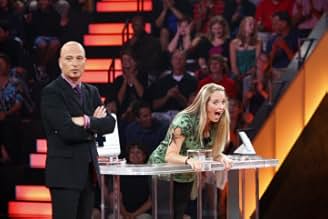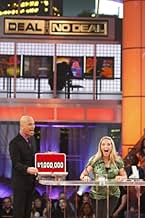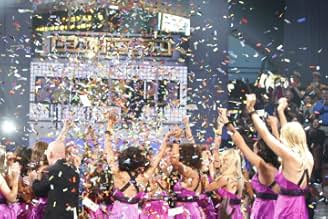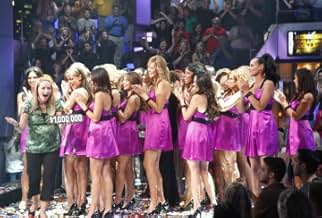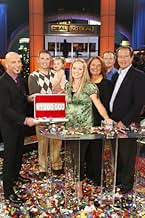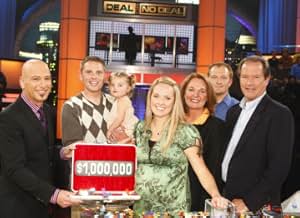ÉVALUATION IMDb
5,1/10
4,5 k
MA NOTE
Ajouter une intrigue dans votre langueContestants face 26 sums of money, 26 suitcases, and one question: Deal or no deal?Contestants face 26 sums of money, 26 suitcases, and one question: Deal or no deal?Contestants face 26 sums of money, 26 suitcases, and one question: Deal or no deal?
- Nommé pour 1 prix Primetime Emmy
- 2 victoires et 9 nominations au total
Parcourir les épisodes
Avis en vedette
What makes a good game show? A good game show is one that the viewer can play at home while watching it on T.V. You can answer Jeopardy questions or you can solve puzzles on Wheel Of Fortune; however - you, as a viewer, really can't do much of anything on this show.
The ONLY exciting thing about this show is the fact that there is big money involved. This is great for the contestant, but the viewer can only live vicariously through the winner.
Seriously, this is only fun to watch when the person loses (or wins) all the money - mostly loses though. It seems that later episodes, the producers put contestants on that had a good sob story (not to diminish them).
I think the reason this game show became such a hit was that they put a pretty good improv comedian (see his early works) as the host and that the games rules are ultra simple - answer only one question (Deal or No Deal).
I can only give this show a rating of 3 because it is the same ole' episode every single time. I can even guess with pretty good accuracy what the banker will offer.
The ONLY exciting thing about this show is the fact that there is big money involved. This is great for the contestant, but the viewer can only live vicariously through the winner.
Seriously, this is only fun to watch when the person loses (or wins) all the money - mostly loses though. It seems that later episodes, the producers put contestants on that had a good sob story (not to diminish them).
I think the reason this game show became such a hit was that they put a pretty good improv comedian (see his early works) as the host and that the games rules are ultra simple - answer only one question (Deal or No Deal).
I can only give this show a rating of 3 because it is the same ole' episode every single time. I can even guess with pretty good accuracy what the banker will offer.
Well, I, for one, find this show to be very interesting and entertaining. Walk away when the commercials come on and come back three or four minutes later and you will eliminate most of the irritation. Howie Mandel does a really good-natured hosting bit that should be a lesson to those that take themselves too seriously.
The girls are great and are having a lot of fun. This show will develop into a truly entertaining habit for the American viewing audience.
I found myself muttering at the ridiculous offers of the mysterious banker (the cheap creep ... get real!) I wanted some of the macho type, posturing contestants to refuse an offer and have to settle for a lot less. (goody goody) .. The whole gamut of human emotions that is strung out here is quite consuming... I look forward to the next show to see what sort of contestant we have and how they will handle it.
I should like so much to slap some of the contestants silly. Greed is either funny or pathetic and sometimes both at once. Tune in and feel very superior to these poor creatures and find yourself pulling for some of them and despising others. All the facets of watching a wrestling match without having to ignore the phoniness. These people really do want that money.
I am trying to tell you why you are going to get hooked. A very nice package and I say, "Yay, Howie, keep it on the fun level that it is now. Watch it. Enjoy it. Don't let anyone tell you it is not worth while until you have tried it yourself. Any night it is NOT on, I am very disappointed.
OLD DAD
The girls are great and are having a lot of fun. This show will develop into a truly entertaining habit for the American viewing audience.
I found myself muttering at the ridiculous offers of the mysterious banker (the cheap creep ... get real!) I wanted some of the macho type, posturing contestants to refuse an offer and have to settle for a lot less. (goody goody) .. The whole gamut of human emotions that is strung out here is quite consuming... I look forward to the next show to see what sort of contestant we have and how they will handle it.
I should like so much to slap some of the contestants silly. Greed is either funny or pathetic and sometimes both at once. Tune in and feel very superior to these poor creatures and find yourself pulling for some of them and despising others. All the facets of watching a wrestling match without having to ignore the phoniness. These people really do want that money.
I am trying to tell you why you are going to get hooked. A very nice package and I say, "Yay, Howie, keep it on the fun level that it is now. Watch it. Enjoy it. Don't let anyone tell you it is not worth while until you have tried it yourself. Any night it is NOT on, I am very disappointed.
OLD DAD
"Deal or No Deal", from Endemol, the folks that gave you "Fear Factor" and "Extreme Makeover", brought this international import to the States for a five-night run on NBC originally back in December 2005. Hosted by Howie Mandel, the show is like a cross between "Let's Make a Deal" and "Russian Roulette", and here's how it works: A contestant out of the audience chooses one numbered briefcase out of 26 for their game. The cases have cash values ranging from one cent all the way up to $1 million (and there are several six-figure prizes starting at $100,000). All the values are posted on a large, projection-screen TV monitor in the studio. The contestant then begins a process of elimination, calling out the numbers of six briefcases. As each number is called, a lovely model opens the numbered case to reveal the cash amount inside (Mandel: "Nikki, open the case."). The cash amount is then removed from the list of cash values on the projection monitor.
Following this, a "banker", seated in a surveillance room above the studio floor, phones the host with an "offer" - a dollar amount he is willing to make for the briefcase the contestant chose at the start of the game. Essentially, the offer is an average of all the cash amounts on the monitor that haven't been yet eliminated - the more low amounts that are eliminated, the higher the offer. The host informs the contestant of the offer - which is posted in large numerals on the projection monitor - and then, after a bit of mathematical banter, the host pops the all-important question to the contestant: "Deal or No Deal?" If the contestant accepts the Deal, he/she wins the value of the offer and the game ends. If not, the contest must open five more briefcases before the next offer is made. If the contestant passes on the Deal at that point, then he/she must open four more cases, then three more, then two more, until in the later points in the game, there is an offer issued after one briefcase is selected.
The tension increases with every round of selections because in many cases, a contestant chooses a case with a large dollar amount, eliminating the possibility of winning that prize. Also adding to the drama - the contestant has three to four other guests (loved ones or friends) on the show to help him/her decide whether or not to take a Deal, usually introduced after the second round of briefcase selections. So there is an emotional aspect to "Deal" as well, one the large studio audience gets pumped up for.
Once the contestant has accepted a Deal, the host has the contestant theoretically play out the rest of the briefcase selections ("Let's see what you would have done...") and then reveals the contents of the briefcase that the contestant chose at the start of the game.
Overall, "Deal or No Deal" offers the best odds for winning $1 million on national TV - 1 in 26. But as host Howie Mandel states at the beginning of each show, the game is a combination of "luck, guts, and a great sense of timing." Part of Mandel's opening spiel: "One million dollars as the top prize. No crazy stunts to perform, no trivia questions to answer. In fact, there's only one question you need to know how to answer, the only question that counts. Deal or No Deal?" At the time of this writing, "Deal or No Deal" was introduced by NBC as a "stripped" broadcast (same time for five consecutive weeknights), airing between 8pm and 9pm Eastern Time. The show's initial ratings for the first two nights were great news for NBC; they handily won their Monday and Tuesday time slots.
Part of the entertainment value of "Deal or No Deal" is watching the contestants agonize over whether to accept a Deal or press their luck; a knowledge (or appreciation) of probability helps a lot, and screen graphics are occasionally shown to help viewers do the numbers (Example: "Kyle has a 25% chance his case contains at least $300,000"). The exchanges between the contestants and their guests are often very funny. Host Howie Mandel, better known for his goofball stand-up comedy and appearances on "The Tonight Show With Jay Leno", is an affable host, not overpowering the show. He has "a great sense of timing" himself, and sets up cliffhangers before each commercial (sending the audience into frustrated groans of anticipation).
And for anyone that doesn't believe there's a play-along element to the show, you get caught up in the moment, screaming at the TV, "Take the deal, you bonehead!" Most NBC affiliates also participated in the "Lucky Case" home game, in which viewers could win $10,000 based on their selection of one of the 26 cases.
Considering "Deal or No Deal" requires no intellectual knowledge (other than, perhaps, a little statistical analysis) nor mastery of a game (such as "Wheel of Fortune" or GSN's "Lingo") it is a surprisingly entertaining show. At the time of this writing, over 30 other countries had their own versions of the show.
Following this, a "banker", seated in a surveillance room above the studio floor, phones the host with an "offer" - a dollar amount he is willing to make for the briefcase the contestant chose at the start of the game. Essentially, the offer is an average of all the cash amounts on the monitor that haven't been yet eliminated - the more low amounts that are eliminated, the higher the offer. The host informs the contestant of the offer - which is posted in large numerals on the projection monitor - and then, after a bit of mathematical banter, the host pops the all-important question to the contestant: "Deal or No Deal?" If the contestant accepts the Deal, he/she wins the value of the offer and the game ends. If not, the contest must open five more briefcases before the next offer is made. If the contestant passes on the Deal at that point, then he/she must open four more cases, then three more, then two more, until in the later points in the game, there is an offer issued after one briefcase is selected.
The tension increases with every round of selections because in many cases, a contestant chooses a case with a large dollar amount, eliminating the possibility of winning that prize. Also adding to the drama - the contestant has three to four other guests (loved ones or friends) on the show to help him/her decide whether or not to take a Deal, usually introduced after the second round of briefcase selections. So there is an emotional aspect to "Deal" as well, one the large studio audience gets pumped up for.
Once the contestant has accepted a Deal, the host has the contestant theoretically play out the rest of the briefcase selections ("Let's see what you would have done...") and then reveals the contents of the briefcase that the contestant chose at the start of the game.
Overall, "Deal or No Deal" offers the best odds for winning $1 million on national TV - 1 in 26. But as host Howie Mandel states at the beginning of each show, the game is a combination of "luck, guts, and a great sense of timing." Part of Mandel's opening spiel: "One million dollars as the top prize. No crazy stunts to perform, no trivia questions to answer. In fact, there's only one question you need to know how to answer, the only question that counts. Deal or No Deal?" At the time of this writing, "Deal or No Deal" was introduced by NBC as a "stripped" broadcast (same time for five consecutive weeknights), airing between 8pm and 9pm Eastern Time. The show's initial ratings for the first two nights were great news for NBC; they handily won their Monday and Tuesday time slots.
Part of the entertainment value of "Deal or No Deal" is watching the contestants agonize over whether to accept a Deal or press their luck; a knowledge (or appreciation) of probability helps a lot, and screen graphics are occasionally shown to help viewers do the numbers (Example: "Kyle has a 25% chance his case contains at least $300,000"). The exchanges between the contestants and their guests are often very funny. Host Howie Mandel, better known for his goofball stand-up comedy and appearances on "The Tonight Show With Jay Leno", is an affable host, not overpowering the show. He has "a great sense of timing" himself, and sets up cliffhangers before each commercial (sending the audience into frustrated groans of anticipation).
And for anyone that doesn't believe there's a play-along element to the show, you get caught up in the moment, screaming at the TV, "Take the deal, you bonehead!" Most NBC affiliates also participated in the "Lucky Case" home game, in which viewers could win $10,000 based on their selection of one of the 26 cases.
Considering "Deal or No Deal" requires no intellectual knowledge (other than, perhaps, a little statistical analysis) nor mastery of a game (such as "Wheel of Fortune" or GSN's "Lingo") it is a surprisingly entertaining show. At the time of this writing, over 30 other countries had their own versions of the show.
Have you ever wanted to win $1,000,000? Well, imagine you were on a set with 26 cases held by hot models, you are choosing your own case and eliminate the others, hoping you win the top prize, while a mysterious figure known as The Banker tries to stop you from winning the million.
That's pretty much what Deal or No Deal is in a nutshell. It's all about being lucky with the cases, the banker and- I have to mention them- the models. Don't act you don't know what I'm referring to.
Anyway, the host of this wildly purely luck game show is Howie Mandel, who is pretty decent with a silly premise like this.
So, if you intended to watch a high-stake game show with a million dollars on the line and hot models, then DOND is the show for you!
That's pretty much what Deal or No Deal is in a nutshell. It's all about being lucky with the cases, the banker and- I have to mention them- the models. Don't act you don't know what I'm referring to.
Anyway, the host of this wildly purely luck game show is Howie Mandel, who is pretty decent with a silly premise like this.
So, if you intended to watch a high-stake game show with a million dollars on the line and hot models, then DOND is the show for you!
I once used to watch deal or no deal regularly. I watched it every time it came on NBC or any other network, but one day I stopped and thought to myself, did I just succumb to insanity as Einstein defined it, according to Einstein insanity is doing the same thing over and over expecting a different outcome (not verbatim). What does this have to do with this show, well keep reading. Deal or no Deal is a show you become an expert at after watching a couple of episodes. Same story same occurrences but maybe the models might differ from one episode to another but mostly even they are the same. So for me there is no point on watching this show regularly when I can predict what's going to happen. After seeing about five or six episodes of this, I could literally tell what case number the players will choose, and what the banker will offer. For a game show it's not bad. But this is not a show you would never get tired of, or at least be in love with for a long time.
Le saviez-vous
- AnecdotesOn the 1 September 2008 episode, Jessica Robinson became the first contestant ever to win the $1,000,000. She turned down an offer of $561,000. The only remaining value left was $200,000. (Season 4, Week 2.)
- ConnexionsFeatured in Screenwipe: Episode #1.2 (2006)
Meilleurs choix
Connectez-vous pour évaluer et surveiller les recommandations personnalisées
- How many seasons does Deal or No Deal have?Propulsé par Alexa
Détails
Contribuer à cette page
Suggérer une modification ou ajouter du contenu manquant



